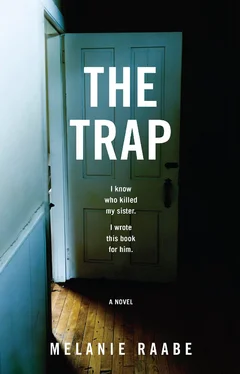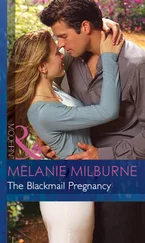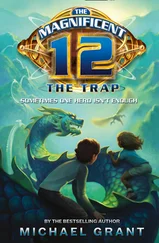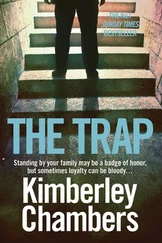“He’s dead,” he says.
I’m in a daze. Julian sits down next to me on the grass, takes me in his arms, enfolds me in his warmth, and at last I begin to cry. In the houses around us, the lights go on.
“Thank you, Frau Michaelis,” the policeman says. “That’ll be all for now.”
“For now?”
“Well, it’s quite possible we may have more questions,” he replies. “A man has shot himself with your gun. And this whole story you’ve told me sounds pretty…complicated.”
“Will I need a lawyer?”
He hesitates. “It never hurts,” he says, getting up.
I don’t have the energy to worry. I found out in the hospital that my ankle isn’t broken but sprained. All the same, I can only use one leg for the time being and I’m still fairly clumsy with the crutches, especially since my right hand is still impaired.
The policeman holds the door open for me. I make it out of the place that I call the “interrogation room” to myself, although I’m not officially being interrogated — only questioned.
As we’re leaving, Julian comes toward us. My heart leaps, I can’t help myself. But he avoids looking me in the eyes. He gives me his hand formally and turns to his colleague.
“They’ve found the phone,” he says. I heave a sigh.
“Did it record the conversation?” I ask.
“My colleagues are still evaluating the data, but it looks like it.”
The other policeman shakes my hand and I’m left alone with Julian. My thoughts stray to our embrace on the lawn; I try not to think about it. As soon as his colleagues joined us, Julian had eased himself away from me; he had stopped calling me Linda and avoided looking me in the eye.
“Frau Michaelis,” he says now, and it sounds final.
“Hello,” I say stupidly and try to catch his eye. He doesn’t give me a chance. He turns around and disappears into his office.
I wonder whether he’s acting so awkwardly toward me because really, deep down inside, he had believed I’d murdered my sister and now feels bad about his mistake. That must be it. Maybe that’s also the reason why he didn’t get in touch after the night we spent together. I think back to what Lenzen said: “A vestige of doubt always remains.” I am glad that Lenzen’s confession on my phone can now eliminate that vestige.
I struggle down the corridor of the police station on my crutches, and suddenly hear a familiar voice behind me.
“Frau Michaelis?”
I turn around clumsily. In front of me is Andrea Brandt. She hasn’t changed in the slightest. Only the smile is new.
“I heard what happened last night,” she says. “You really should have left that to us.”
Last night. It’s only slowly sinking in. It is actually over. I don’t reply.
“Ah well,” the policewoman says. “I’m glad you’re all right.”
“Thanks.”
For a second, it looks as if she were about to say something else. Maybe it’s at this point that she realizes it was me on the phone a few months ago — the witness who called her and hung up. Then Andrea Brandt gives an almost imperceptible shrug, says, “All the best,” and disappears.
At the exit, I look back. I’ve changed my mind. One step at a time, I heave myself back down the corridor on my crutches. I think what a lot I have to do — speak to my lawyer, talk to my parents, collect Bukowski, ring my publishers, warn my agent, in case the press should call her, sleep, have a shower, think about where I’d like to live in the future (because I don’t dare go back to my house — not yet, at least; the last time I set foot in it, I didn’t go out again for over a decade). I have to speak to someone about my panic attacks, which have worsened, now that the strain is over and I’m no longer only fighting for sheer survival. Such a lot to do.
Instead, I knock at the door that Julian had disappeared behind, and open it.
“May I come in?” I ask.
“Of course, Frau Michaelis. Please, come in.”
At last I have time to have a proper look at him. He’s sitting behind a huge, tidy desk. He looks good.
“Really?” I ask.
“Of course. Come on in.”
“No, I meant are you really going to call me Frau Michaelis? Really?”
For the first time today, Julian looks me in the eyes.
“You’re right, Linda,” he says. “It’s probably silly. Sit down, won’t you?”
I hobble over to the chair he’s offered me, maneuver myself into it and prop my crutches up against the desk.
“I’ve come to say thank you,” I lie. “You saved my life.”
“You saved your own life.” We’re silent for a moment.
“You were right all along,” I say at last. “It was a crime of passion.”
Julian nods deliberately. Once again we are quiet, only this time the silence is longer, tenacious and uncomfortable. The clock on the wall to my left ticks.
“I never thought you’d killed your sister,” Julian blurts out into the silence.
I stare at him in astonishment.
“That’s what you wanted to ask me, isn’t it?” he says. I nod.
“Never,” he says.
“When I rang up, you were so…” I begin. But he doesn’t let me finish.
“I hadn’t heard from you for almost twelve years, Linda. And then you ring out of the blue in the middle of the night, wake me up and ask me these questions. No ‘Hello, Julian, how are you? Sorry I haven’t been in touch.’ How did you expect me to react?”
“Wow,” I say.
“Yes, exactly. Wow. That’s what I thought too.”
“Hang on a second. You were going to get in touch. That was the deal. You were the one who was still married. You said you’d give me a sign when you were ready,” I say, furious.
My old disappointment is rising to the surface again, bitter and dogged — twelve years old.
“Oh well, it doesn’t matter now,” I add. “Sorry to wake you and your girlfriend. It won’t happen again.”
I try to get up. A stabbing pain pierces my foot. Julian stares at me in surprise. Then he grins.
“You thought Larissa was my girlfriend?”
“Fiancée, wife…whatever.”
I lose the battle with my crutches and give up, exhausted.
“Larissa’s my sister,” Julian says, smiling. “She lives in Berlin.” My heart skips a beat.
“Oh,” I say, stupidly, “I didn’t know you had a sister.”
“There’s a great deal you don’t know about me,” Julian replies, still smiling. Then he goes back to being serious. “By the way, I did get in touch, Linda,”
“Don’t give me that! I waited for you!” He’s silent for a while, as if in a daze.
“Do you remember the conversation we had about literature?” he asks at length.
“What’s all this about?”
“Do you remember? Our first proper conversation. All those years ago, on the steps outside my house?”
“Of course. You said you didn’t have the patience for novels and couldn’t get anything out of them, but that you loved reading poetry.”
“And you said that poetry didn’t do anything for you. I said one day I would take the time to convert you. Do you remember?”
I do remember.
“Yes. You said I should try Thoreau or Whitman — that they were bound to teach me to love poetry.”
“You do remember,” Julian says, and then the penny drops.
I recall the dog-eared copy of Whitman on my bedside table, sent to me years and years ago by some fan. At least that’s what I thought. The book that has seen me through my darkest hours and even saved me on that sleepless night before the interview. My knees go soft.
“That was your sign?” I ask, stunned.
Julian shrugs. All my strength drains away and I slump back into the visitor’s chair.
“I didn’t realize, Julian. I thought you’d forgotten me.”
Читать дальше












